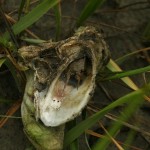
Imagine the last time you went to an oyster roast – good food, happy friends, and maybe a delicious smelling fire to warm your toes. Someone brought warm homemade crackers. The youngest in the crowd is both delighted and disgusted at the discovery of a lucky oyster crab in the corner of his oyster shell.
Moments like these that help define what sustainability means – a desire for the continued existence of those oyster roasts. That requires healthy estuaries to make oysters every year, careers that keep people in the community, and healthy local farming for trees and agriculture. Moments like these define the word ‘rural’, where residents are dependent on the natural resources they interact with daily for food and livelihood. This could mean life on a farm in one of the most sparsely populated regions of the country or a piece of the rural carved out of an increasingly urbanized landscape. Rural describes an ethic and a way of life more than any particular location.
Part of Southern Fried Science has always held a rural ethic dear to our hearts, as conservation and community are inextricably linked. As we move into the future, our stories may stray from the oysters, collards, ham, and moonshine of the South, but we will continue to bring you stories of the communities with their fingers on the pulse of the planet’s resources. It is often in regions like these that stories of optimism and hope emerge, from successfully managed small-scale fisheries to upstream residents voluntarily regulating themselves for the benefit of downstream neighbors.
The rural landscape and its small communities are prominent pieces of American history; their culture should be celebrated along with the wonders of nature with which it is entangled. Maritime communities connected to the ocean are particularly poignant examples of how many ways the human and environment elements come together to form the world we live in. This culture may have been swallowed by New York City or remain a small fishing village – either way, the rural voice is easy to lose in the buzz of the information age. We strive to highlight these voices, serving as a reminder of the human connection to our environment.
